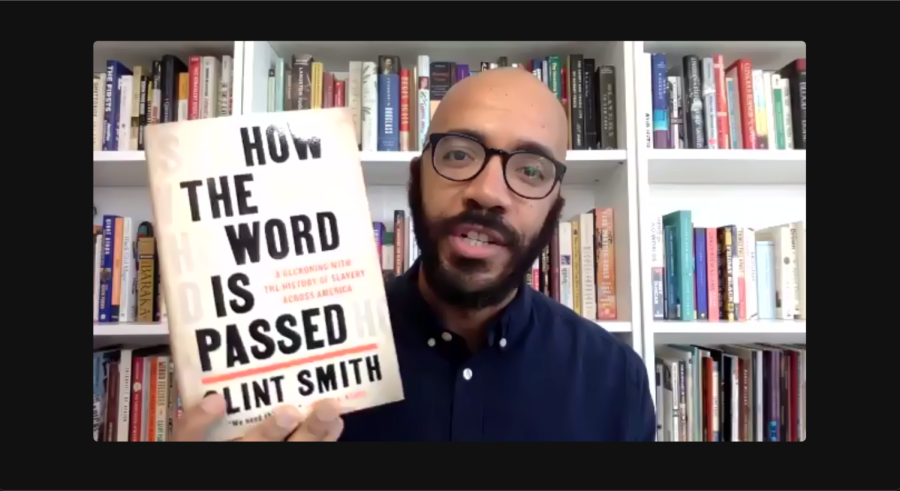Author Clint Smith Talks Critical Race Theory and His Book “How The Word Is Passed”
Smith speaks to his experiences writing the book in a virtual MLK day event
Clint Smith holds up his book “How the Word Is Passed”
January 31, 2022
In a virtual Martin Luther King Jr. day event, author Clint Smith spoke about finding that many people have a complex relationship with a more honest telling of America’s racial history that they have not been told. Sometimes the stories they first learned in school make them unwilling to accept empirical evidence that contradicts their beliefs.
“For so many people history is not about primary source documents or empirical evidence,” Smith said. “It is a story that they are told. And it is a story that they tell. It is an heirloom that is passed down across generations. It’s something where loyalty takes precedence over truth.”
For one example, Smith recounted experiences visiting places such as the Monticello Plantation, which belonged to Thomas Jefferson. He points to Jefferson’s story as an embodiment of a contradiction some are unwilling to accept. While Jefferson wrote and contributed to incredibly important documents, he also owned over 600 slaves.
“I think again, about how Jefferson is a microcosm for the story of America, in which we are so committed to the idea of American exceptionalism that we inevitably suppress these stories that make us look unexceptional.”
Smith recalled an encounter during his tour of Monticello and an interaction with tourists who had never known Jefferson owned slaves. For these people, and many others, that part of the story is left untold.
“We can’t talk about Jefferson as a president unless we’re also going to talk about Jefferson as (an) enslaver,” he said. “We can’t talk about the Confederacy without talking about how the Confederacy was specifically founded with the intention of perpetuating the institution of slavery for millions of people.”
Smith pointed to specific historical figures and historical sites that have darker stories that are not always told or are completely ignored. This suppressed history has been called “critical race theory” and has been the subject of much discussion in modern political discussions.
“Sometimes people will call truth ideological,” Smith said. “Sometimes people will call fact something that is reflective of politics. Sometimes people will call the empirical evidence something that is reflective of a sort of a sinister, you know, desire to indoctrinate children with a set of political or ideological beliefs, when it is in fact just being truthful and being honest. “
Smith also spoke about his experience visiting the Louisiana State Penitentiary which is known as “Angola.” It is the largest maximum security prison in the United States and is built on land that previously was a plantation. It hosts a population of majority black men, and over 70% are serving life sentences. Smith presented this experience as part of an ongoing need for America to reconcile with its darker history.
The land the prison is built on represents a dark stain of slavery, he said, but that stain continues to have an afterlife where prisoners work in fields for little to no pay, and where there is a gift shop where items are sold such as t-shirts displaying “Angola: A Gated Community.” He presented this to be as absurd as if there was a prison in Germany in the same location where there were former concentration camps that contained a majority population of Jewish prisoners.
“Not only is it a place that is not fully accounting for how the landscape of that institution is so deeply connected to the history that it’s a part of, as the scholar Saidiya Hartman calls it, ‘the afterlife of slavery’ and how our social political and economic institutions are very much born out of…the residue and remnants created during the period of enslavement.”
Smith ended his session placing importance on understanding the whole and honest history of our country, especially in understanding how the story of slavery is told.
“I think if we tell a more honest story about this country then we gain a deeper and more profound sense of why our country looks the way that it does today.”
Clint Smith has a Ph.D in Education from Harvard University and is a staff writer at The Atlantic. He is the author of “How the Word is Passed.”




















